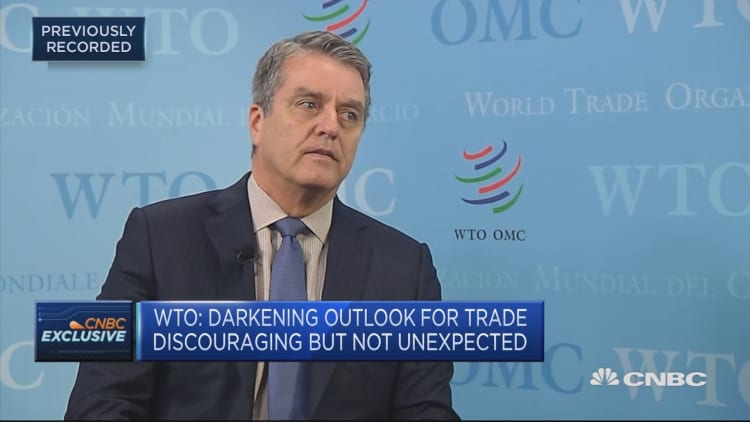The United States, Europe and China have clashed over trade policy for several years and tensions could continue for decades without serious reform, experts have told CNBC.
One of the most contentious points is the future of the World Trade Organization (WTO) — an intergovernmental institution that regulates international trade practices. President Donald Trump has called the WTO "broken," saying countries such as China have taken advantage of it. The U.S. has also threatened to leave.
Speaking last month at the World Economic Forum in Davos, Switzerland, Trump said the WTO "has been very unfair to the United States for many, many years. And without it, China wouldn't be China, and China wouldn't be where they are right now." Standing right next to the president, WTO Director General Ricardo Azevedo accepted that it "has to be updated. It has to be changed. It has to be reformed."
But the question is how?
A failed institution?
"The WTO hasn't produced any big achievements since 1994, when the Uruguay Round closed, and has progressively lost its attractiveness," Fredrik Erixon, an international trade expert at the Brussels-based think tank ECIPE, told CNBC via email. The Uruguay Round was a trade negotiation involving 123 countries which led to the creation of the WTO.
The latter was officially formed in 1995 and expanded world trade rules beyond just goods. The Geneva-based institution covered trade in services and intellectual property for the first time. However, critics say it's still failed to evolve since its creation.
"It hasn't updated rules and commitment to make them fit with the modern 21st century economy, substantially dependent on services, digitization and cross-border flows that are different from the goods-trade flows that give life to much of the WTO rules," Erixon told CNBC.
In the latest blow to the WTO, the U.S. is reportedly looking to leave the WTO's government procurement agreement. This would block most foreign and non-defense contractors, from countries such as Canada, the U.K. and the EU, from bidding on U.S. tenders.
Without a deal featuring buy-in by all of the major players, trade conflict will become the new normal.Chad BownSenior fellow at PIIE
Furthermore, the U.S. has also prevented the appointment of new judges to the appellate body of the WTO. The group was responsible for hearing and deciding on international trade disputes, and it means it can no longer issue rulings.
To overcome this, the EU, China and 15 other WTO members agreed in January to have an ad-hoc appeals body, with the U.S. not part of this temporary agreement.
What kind of new WTO?
"The WTO requires new rules to deal with the fact that China is not a market-oriented economy and is unlikely to become one anytime soon. Its economic system involves subsidies, that arise in a number of implicit and explicit forms, that companies and workers in other countries find unfair," Chad Bown, a senior fellow at the Peterson Institute for International Economics, told CNBC.
Trump has often blamed the WTO for not stopping China from helping its own companies. Some trade experts believe Trump entered the trade war with Beijing because the WTO was not addressing this issue. China became a member of the WTO in 2001 and its economy has boomed exponentially ever since.
"China is willing to pursue some economic reforms that are also desired by the U.S. and the EU, but their appetite for bold reforms are close to zero and therefore we will likely have a decade or two in front of us with (a) series of trade frictions and small compromises," Erixon from ECIPE said.
Bown told CNBC that members need to agree to new rules on subsidies. "Without a deal featuring buy-in by all of the major players, trade conflict will become the new normal," he said.



